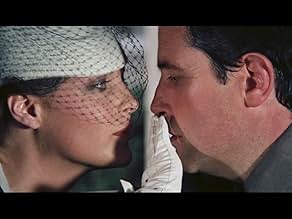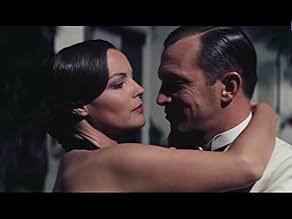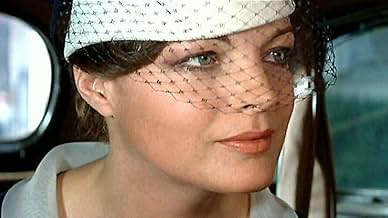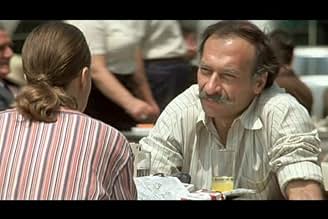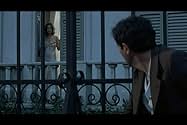Une femme à sa fenêtre
- 1976
- Tous publics
- 1h 50m
IMDb RATING
6.1/10
688
YOUR RATING
Margot Santorini is an aristocratic woman in 1936 in Greece, who amuses herself pursuing a shallow loveless affair with a nobleman, but unexpectedly falls in love with a political activist.Margot Santorini is an aristocratic woman in 1936 in Greece, who amuses herself pursuing a shallow loveless affair with a nobleman, but unexpectedly falls in love with a political activist.Margot Santorini is an aristocratic woman in 1936 in Greece, who amuses herself pursuing a shallow loveless affair with a nobleman, but unexpectedly falls in love with a political activist.
- Awards
- 2 nominations total
Carl Möhner
- Von Pahlen
- (as Carl Mohner)
Sandra Burguy
- Margot fille à sept ans
- (uncredited)
Francisco Franco
- Self
- (archive footage)
- (uncredited)
Jean Martin
- Drieu La Rochelle
- (uncredited)
Featured reviews
It's passed into legend: how the young Turks of French cinema--Truffaut, Chabrol, Godard and the others--wanted to sweep away the dusty relics of the previous generation, the so-called well made films. What's less known is how those young Turks went on to make some of the stuffiest movies of the late 60's and 70's: I'm thinking of Resnais's Stavisky, Chabrol's Juste avant la nuit and La decade prodigieuse, Truffaut's Dernier Metro. The art decoration and costumes are impeccable; the stories often leave you falling asleep. Pierre Granier-Deferre is the same age as the men I've mentioned, but never gave in to the urge to experiment. As a result he never fell into total boredom, just as he never excites us.
Drieu la Rochelle killed himself in 1945 before he could be charged with collaborating with the Germans, so he's always been a little daring for film directors. Louis Malle, who would take on any project, made a great film out of Le feu follet. Granier-Deferre is careful not to upset the sensibilities of those who remember the war, and the horrors of collaboration. I'm sure he makes Boutros out to be a more sympathetic character than he is in the novel. Victor Lanoux plays him with a lot of charm, making him a great foil for Romy Schneider who is at the peak of her glory here. Philippe Noiret gives excellent support as the rich man who wants to support Romy. It's a shame the direction is so stodgy; the camera hardly moves in those overdecorated rooms.
Drieu la Rochelle killed himself in 1945 before he could be charged with collaborating with the Germans, so he's always been a little daring for film directors. Louis Malle, who would take on any project, made a great film out of Le feu follet. Granier-Deferre is careful not to upset the sensibilities of those who remember the war, and the horrors of collaboration. I'm sure he makes Boutros out to be a more sympathetic character than he is in the novel. Victor Lanoux plays him with a lot of charm, making him a great foil for Romy Schneider who is at the peak of her glory here. Philippe Noiret gives excellent support as the rich man who wants to support Romy. It's a shame the direction is so stodgy; the camera hardly moves in those overdecorated rooms.
All seems beautiful in the case of this film - from intentions to cast, from Greek locations to the rooms. Not so inspired is the result.
A non-lineary story, romance and politics, historical/ literary references, Romy Schneider in her late shining , Philippe Noiret and, for both , the memory of Le Vieux Fusil , Victor Lanoux in the role of revolutionary and lover and the bizarre rhytmus of story, strange use of this promissing pieces of a great adaptation.
It seems no direction about this too good intentionned movie. And this sin defines, unfortunately, it. An air of fatigue seems define the film , each character seeming reduced at himself and the dialogue of Jorge Semprun seeming only a shield against time and the other.
A non-lineary story, romance and politics, historical/ literary references, Romy Schneider in her late shining , Philippe Noiret and, for both , the memory of Le Vieux Fusil , Victor Lanoux in the role of revolutionary and lover and the bizarre rhytmus of story, strange use of this promissing pieces of a great adaptation.
It seems no direction about this too good intentionned movie. And this sin defines, unfortunately, it. An air of fatigue seems define the film , each character seeming reduced at himself and the dialogue of Jorge Semprun seeming only a shield against time and the other.
basis of question - is it enough to have a good cast for to do a nice film ? in this case, the answer is not easy. and the fundamental error is the full of good intentions basket. a large puzzle. a lot of problems each only in drawing form. so, in final, a poor verdict - one of last roles for Romy Schneider. remembrance for her admirers. and regret about good ingredients in a confuse work. it is in middle of ways. it is not a love story, not a credible one. it is not a politic story because it remains only sketch not very inspired. it is not about Greece past because the details are only small clues. it is not support for philosophical speeches because this aspect is always fake. it is a promise. is it enough ? maybe, not exactly.
This movie promised great things:Philippe Noiret,Victor Lanoux and Umberto Orsini as the three male principals ,and Romy Schneider,as beautiful as ever ,now in the late part of her career;plus the magnificent Greek landscapes;plus a love affair between a communist (Lanoux)and a diplomat's wife ;plus politics;plus a non-linear plot.
But ,for all that, the movie is boring,and if it weren't for the cast,you'd often feel like giving up;politics ,yes,military dictatorship,but most of the time,it stays theoretical ,although Noiret calls Greek mythology to the rescue (Oedipus and Antigone),the characters remain hollow and the passionate love story lacks focus ,intensity and passion ;as for the political side ,it is only skimmed over ,Granier-Deferre being not Costa -Gavras for that matter.
The characters move in a world of luxury and the only pictures of the victims of the dictators are those the lady sees from the window ....of her car as she passes through a wasted land in the hands of the soldiers.
But ,for all that, the movie is boring,and if it weren't for the cast,you'd often feel like giving up;politics ,yes,military dictatorship,but most of the time,it stays theoretical ,although Noiret calls Greek mythology to the rescue (Oedipus and Antigone),the characters remain hollow and the passionate love story lacks focus ,intensity and passion ;as for the political side ,it is only skimmed over ,Granier-Deferre being not Costa -Gavras for that matter.
The characters move in a world of luxury and the only pictures of the victims of the dictators are those the lady sees from the window ....of her car as she passes through a wasted land in the hands of the soldiers.
Did you know
- TriviaMost Greek actors participating in this film are dubbed in French and almost all of them are uncredited.
- ConnectionsReferenced in Doste tin tsonta sto lao!.. (1983)
- How long is Une femme à sa fenêtre?Powered by Alexa
Details
- Runtime1 hour 50 minutes
- Sound mix
- Aspect ratio
- 2.35 : 1
Contribute to this page
Suggest an edit or add missing content

Top Gap
By what name was Une femme à sa fenêtre (1976) officially released in India in English?
Answer
![Trailer [OV]](https://m.media-amazon.com/images/M/MV5BOTMwNmYyY2UtNzExMy00MmNiLWFmYjItOTJhNDRkMzAzODdhXkEyXkFqcGdeQXRyYW5zY29kZS13b3JrZmxvdw@@._V1_QL75_UX500_CR0)


